
Chapter 38 Numbers in Latin YouTube
En la lección de hoy, aprenderá a CONTAR DEL 01 (I) AL 10 (X) en latín. Hoy en día usamos el sistema de numeración arábiga pero los romanos usaban su propio sistema de numeración llamado números romanos como veremos. Conocer sus números latinos es muy importante para cualquier hablante latino. La siguiente tabla muestra los números en.

Latin Numbers 1 to 10 YouTube
Los números del 1 al 100 en Latín. Averigua cómo se dice cualquier número en Latín hasta 999 billones. Latín. Juegos de palabras para Principiantes. Conjuntos de palabras Opción múltiple Juego del Ahorcado Sopa de Letras Crucigrama Flashcards Memory Intermedio Categorías Progresivo Opción múltiple Progresivo.
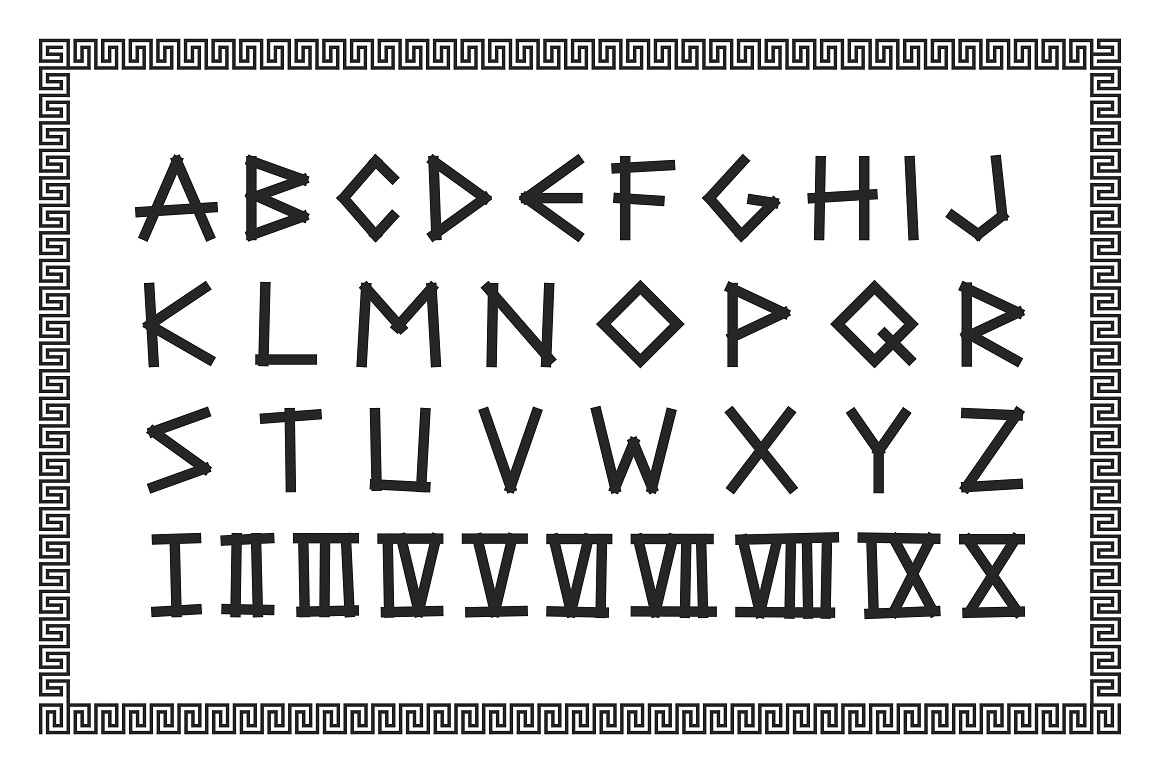
Ancient latin letters with numerals
Understanding Cardinal Numbers in Latin. Latin numbers are usually adjectives. When there are three forms, the Latin number has a masculine, feminine, and neuter form, in that order. The numbers follow the appropriate declension rules. Note that there is no singular form for most of the numbers and no plural form for the number 1.

PIVEL GREGORIANO Los numeros en Latín PIVEL GREGORIANO
Cardinal Numbers 21-100. Counting from 21 to 100 in Latin follows a particular pattern. The numbers from 21 to 29 are formed by combining the word "viginti" (twenty) with the numbers from 1 to 9. For example, 21 is "viginti unus" (twenty-one), 22 is "viginti duo" (twenty-two), and so on. From 30 to 39, the pattern changes slightly.

Latín de 4ºESO IESO Alconétar Números cardinales y ordinales
The Roman numeration. The Roman numbers are formed from seven letters or symbols: I [1], V [5], X [10], L [50], C [100], D [500], and M [1,000]. Used in ancient Rome and during the Middle Ages, they allow to count up to 4,999 through a both additive and subtractive system. To form a number, we add the symbols from left to right until we get.
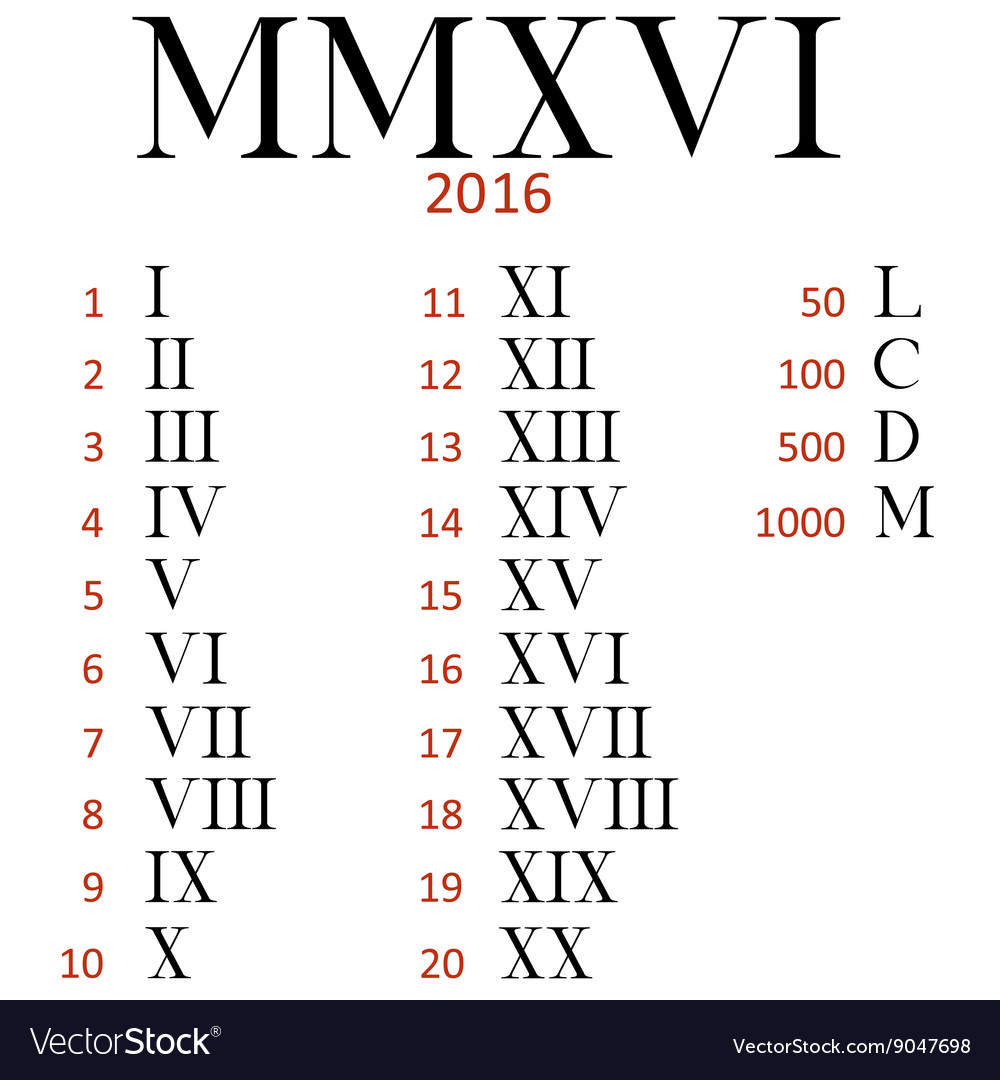
Set roman numerals Royalty Free Vector Image VectorStock
IX ( nōnus) X ( decimus) To create the number six, add the symbol for 5 and 1, with the 1 on the right hand side. To create the number four, place the 1 before the 5. Think of it as 1 less than 5, which equals 4. The same goes for 9. Place the 1 on the left hand side before the 10 and you'll get 9. Tags: Latin numbers.

Numerales en latín Adjetivo Relaciones sintácticas
Números en Latín. En el español usamos numerales (1,2,3) los cuales son basados en numerales árabes. Por su parte, los romanos utilizaban letras de su alfabeto (I, V, X, L, C, D, M). No hay símbolo para el zero en el sistema numérico romano. Los nombres de los números son los nombres cardinales. O sea, son el equivalente a 'uno', 'dos.
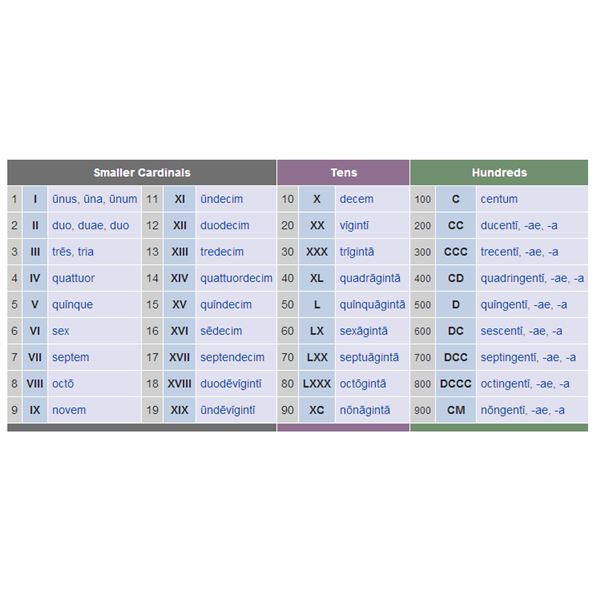
Latin Numbers
I placed after V and X make 6 (VI) and 11 (XI) X placed after L and C make 60 (LX) and 110 (CX) C placed after a D and M make 600 (DC) and 1,100 (MC) 3. No numeral will ever be used more than three consecutive times [ sometimes it is seen in older Latin texts, but this is rare] 4 (IV) and 40 (XL) will NEVER be written IIII or XXXX.

Numbers — Latin for Rabbits
Find numerare (Verb) in the Latin Online Dictionary with English meanings, all fabulous forms & inflections and a conjugation table: numero, numeras, numerat, numeramus, numeratis, numerant

Lámina metálica «Números latinos Números en latín Números romanos Versión 2» de HiddenVerb
Reglas de numeración del idioma latín. Ahora que ha tenido una visión general de los números más comunes, pasemos a las reglas para escribir decenas, números compuestos, y por qué no cientos, miles y más allá (si es posible). Los números del cero al diez tienen nombres específicos: nulla [0], unus / una / unum (m/f/n) [1], duo / duae.

Pin on Latin Class
The Latin numerals are the words used to denote numbers within the Latin language. They are essentially based on their Proto-Indo-European ancestors, and the Latin cardinal numbers are largely sustained in the Romance languages.In Antiquity and during the Middle Ages they were usually represented by Roman numerals in writing.. Latin numeral roots are used frequently in modern English.
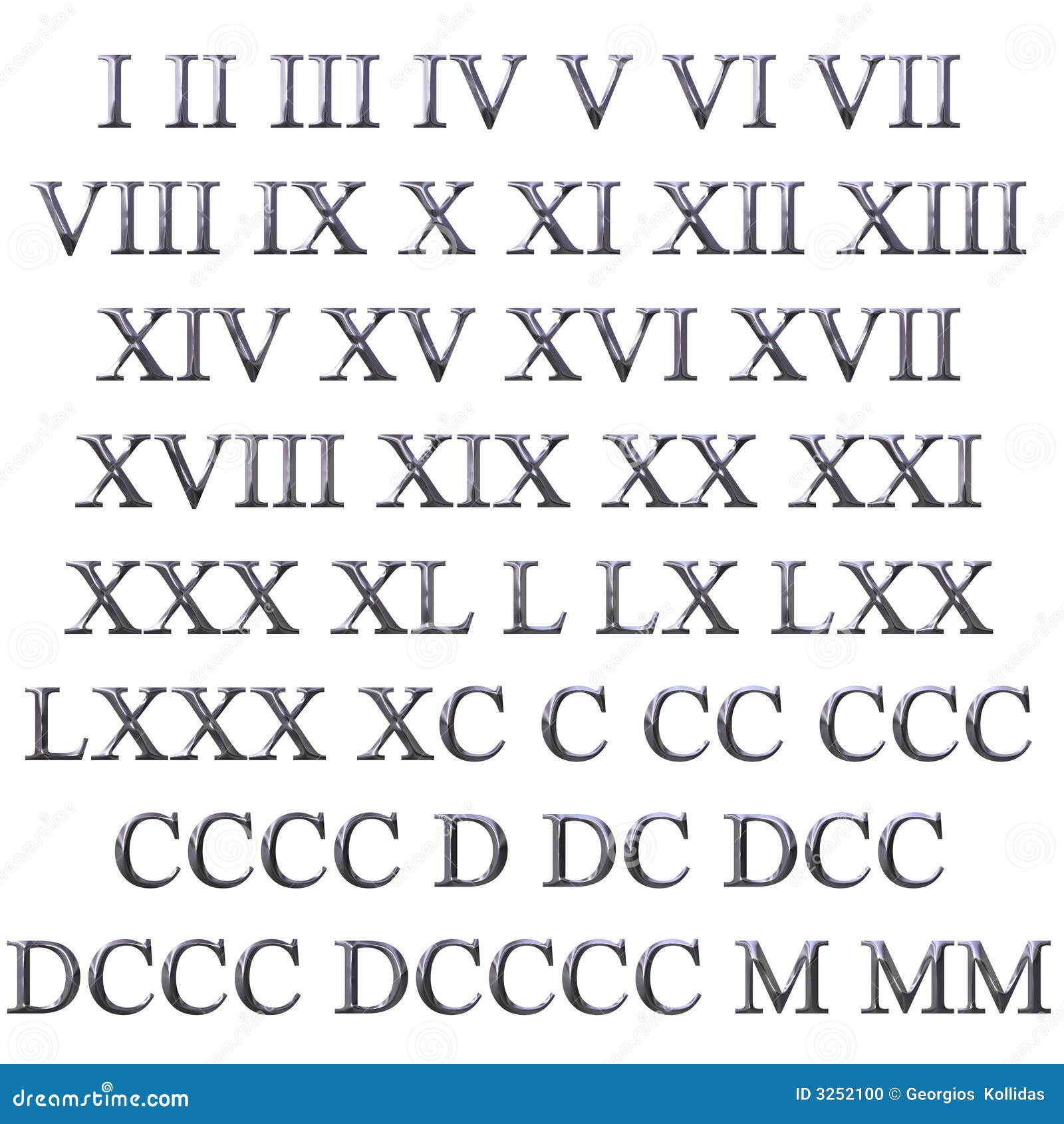
3D Silver Latin Numbers Stock Photo Image 3252100
A continuación, se presenta una lista de los números en latín del 1 al 20, junto con su traducción al español y su respectiva pronunciación fonética: 1. unum (únun) 2. duo (dúo) 3. tres (trés) 4. quattuor (kuátor) 5. quinque (kuínkue) 6. sex (seks) 7. septem (séptem) 8. octo (ókto)

Pin by LucyCris on Matemáticas Latin language, Math, Education
Saying The Tens With Latin Cardinal Numbers. Over twenty, any number between the tens, such as 20 and 30, is the tens number plus the number above the tens number. For example, thirty-five in Latin is triginta quinque. Triginta, meaning 30, plus quinque, meaning 5, which gives you thirty-five. An alternative of writing this would quinque et.
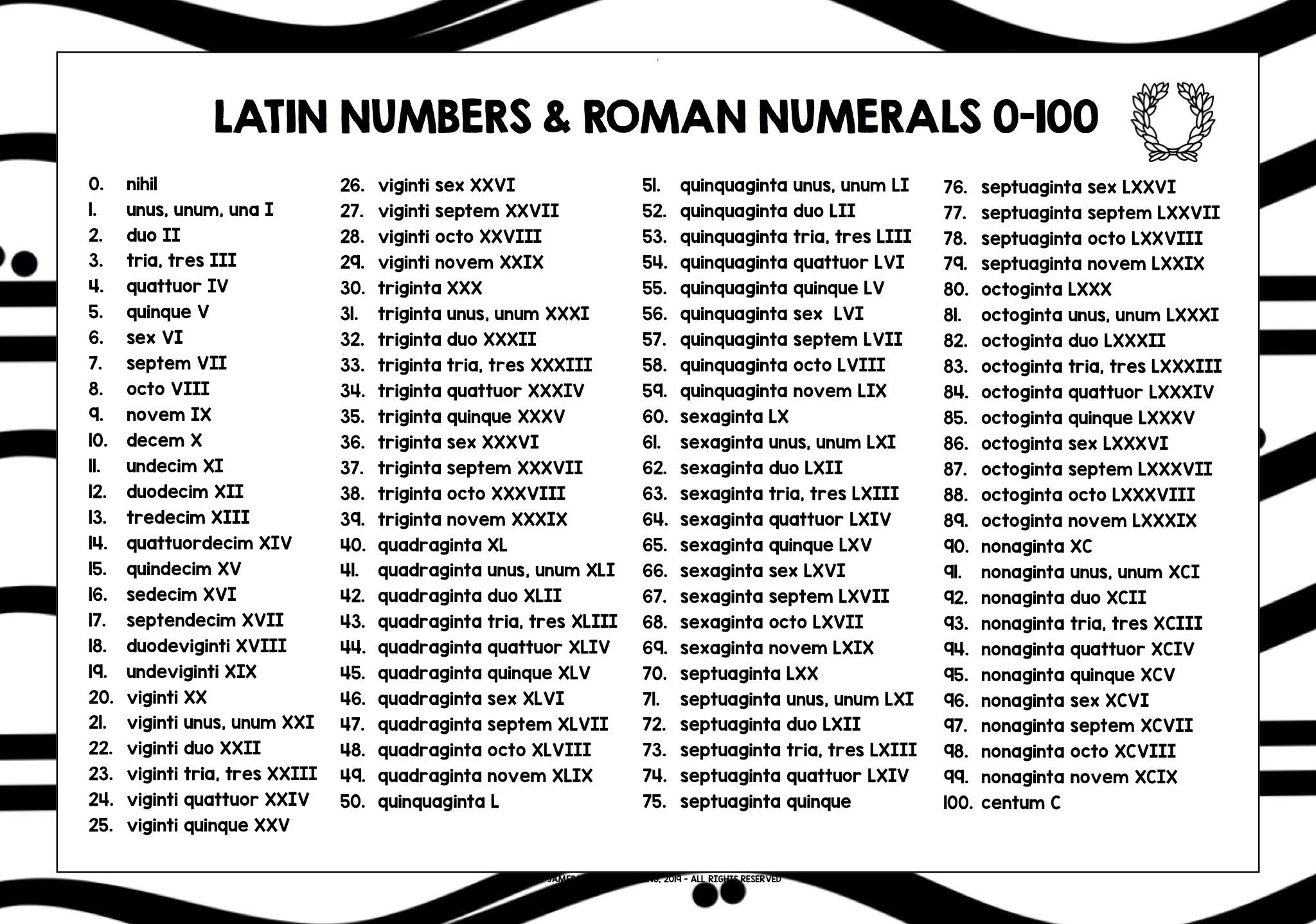
LATIN NUMBERS & ROMAN NUMERALS 0100 LIST 2
Latin Numbers can be expressed in both Arabic and Latin numeral notation. Knowing your Latin numbers is essential for any Latin speaker, whether you're a beginner or advanced, so I've included a table below for your convenience. If you know your numbers from 1-100, I promise you'll impress your friends for many a Superbowl to come.

Numbers in Latin YouTube
Numbers in Latin. How to count in Latin (lingua Latina) with cardinal and ordinal numbers. Key to abbreviations: m = masculine, f = feminine, n = neuter. If any of the numbers are links, you can hear a recording by clicking on them. If you can provide recordings, please contact me .

Numeralul Latin
In grammatical terms, a cardinal numeral is a word used to represent such a countable quantity. The English words one, two, three, four, etc. are all examples of cardinal numerals. In Latin, most cardinal numerals behave as indeclinable adjectives. They are usually associated with a noun that is counted, but do not change their endings to agree.